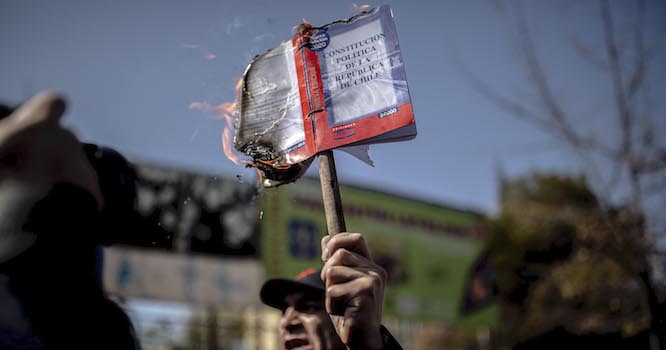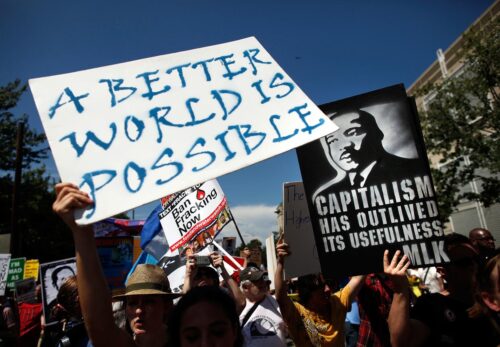During the 21st century, the US, working with corporate elites, traditional oligarchies, military, and corporate media, has continually attempted coups against Latin American governments which place the needs of their people over US corporate interests. US organized coups in Latin American countries is hardly a 20th century phenomenon.
However, this century the US rulers have turned to a new coup strategy, relying on soft coups, a significant change from the notoriously brutal military hard coups in Chile, Argentina, Uruguay, and other countries in the 1970s. One central US concern in these new coups has been to maintain a legal and democratic facade as much as possible.
The US superpower recognizes successful soft coups depend on mobilizing popular forces in anti-government marches and protests. Gene Sharp style color revolutions are heavily funded by US and European NGOs, such as USAID, NED, National Democratic Institute, International Republican Institute, Open Society Foundations, Ford Foundation, and others. They make use of organizations professing “human rights” (such as Human Rights Watch, Amnesty International), local dissident organizations, and increasingly, liberal-left media (even Democracy Now) to prepare the groundwork.
US regime change operations have found three mechanisms this century that have been tremendously successful. First, economic warfare on a country, through sanctions and outright blockades, creates rising discontent against the targeted government. Second, increasing use of corporate media and social media to spread disinformation (often around “human rights,” “democracy,” “freedom,” or “corruption”) to foment mass movements against leaders that prioritize their nation’s development over US financial interests. This heavily relies on CIA social media operations to blanket a country with disinformation. Third, lawfare, using the appearance of democratic legality to bring down those defending their country’s national sovereignty. Related to lawfare are the electoral coups in countries such as Haiti, Honduras, and Brazil, where the US engineers or helps to engineer a coup by stealing the election.
Many of the attempted coups failed because the people mobilized to defend their governments, and because of crucial and timely solidarity declarations in defense of these governments by the Latin American bodies of the OAS, UNASUR, and the Rio Group. Today, the Rio Group no longer exists, UNASUR is much weakened, and the OAS is now fully under US control.
US Backed Coups and Attempted Coups
2001 Haiti. Haitian paramilitaries based in the Dominican Republic launched an attack on the National Palace, seat of the government of President Aristide. The attack failed, but until 2004, similar to the 1980s Nicaraguan contras, these paramilitaries launched numerous raids into Haiti, and played a key role leading to the 2004 coup perpetrated directly by US troops.
2002 Venezuela. The US government partially funded and backed the short-lived April 11-14 coup against Hugo Chavez.
2002-3 Venezuela. Management of the state oil company PDVSA organized an “oil strike,” actually a lockout of the oil workers, to drive Hugo Chavez out of power. This again failed in early 2003.
2003 Cuba. In the lead up to the March 2003 US invasion of Iraq, John Bolton claimed Cuba was a state sponsor of terrorism, producing biological weapons for terrorist purposes, just as Saddam’s Iraq was falsely claimed to have weapons of mass destruction (WMDs). During this period, the US increased its anti-Cuba propaganda directed at the country and increased funding to “pro-democracy” groups in Cuba, while anti-Cuban right-wing groups escalated their activities. The US paid “dissident” groups to organize protests and disruptions, including hijacking seven boats and airplanes to reach the US where they were never prosecuted. The goal was to create the appearance of disorder in Cuba, which, combined with its alleged biological WMDs, demanded an international intervention to restore order. Cuba squashed this movement in spring 2003.
2004 Haiti. In an early 20th century style US coup, US troops invaded Haiti, kidnapped President Jean Bertrande Aristide and exiled him to the Central African Republic.
2008 Bolivia. The Media Luna attempted coup involved right-wing leaders and some indigenous groups from Bolivia’s lowlands financed by the US. They sought to separate the richer Media Luna region from the rest of the country. In the process, they killed 20 supporters of President Evo Morales. Juan Ramon Quintana of the Bolivian government reported that between 2007-2015, the NED gave $10 million in funding to some 40 institutions including economic and social centers, foundations and NGOs. US embassy cables showed it sought to turn social and indigenous movements against the Evo Morales government.
2009 Honduras. Honduran military forces, under orders from the US, seized President Manuel Zelaya, brought him to the US military base at Palmerola, then exiled him to Costa Rica. This began an era of brutal neoliberal narco-trafficking regimes that ended in 2021 with the landslide election of Xiomara Castro, Zelaya’s wife.
2010 Ecuador. In September a failed coup against President Rafael Correa by military and police units backed by the indigenous organizations CONAIE and Pachakutik. The US had infiltrated the police and armed forces, while the NED and USAID funded these indigenous organizations.
2011 Haiti. Following the Haiti earthquake in 2010 that killed 200,000, Secretary of State Hillary Clinton imposed Michel Martelly as president after threatening to cut off US aid to Haiti. Clinton flew to Haiti to demand that Martelly be named one of the two runoff candidates, although Martelly was not recognized by the Electoral Council as one of the qualifiers. Despite a voter boycott, with fewer than 20% of the electorate voting, Martelly was announced the winner of the “runoff.” One reason why most Haitians boycotted was that the most popular political party in the country, Fanmi Lavalas, the party of former President Jean-Bertrand Aristide, was excluded from the ballot. The Haiti elections were funded by USAID, Canada, the OAS, the European Union and other foreign bodies.
2012 Paraguay. President Fernando Lugo was scapegoated for a land occupation confrontation between campesinos and the police, which led to 17 deaths. President Lugo was removed from office without a chance to defend himself in a lawfare coup.
2013 Venezuela. After the April election that Nicolas Maduro narrowly won, Henrique Capriles, the US-supported loser, claimed the election was stolen and called his supporters out into the streets in violent protests. Due to the strength of the UNASUR countries at the time, the US could not convince other countries to also reject Maduro’s victory.
2014 Venezuela. “La Salida”(The Exit), led by Leopoldo Lopez and Maria Corina Machado, resulted in 43 deaths, and aimed to drive President Maduro from power. Again, the US could not get other Latin American governments to denounce Maduro, either in UNASUR or in the OAS.
2015 Ecuador. Between 2012-2015, $30 million from NED went to political parties, trade unions, dissident movements, and media. In 2013 alone, USAID and NED spent $24 million in Ecuador. This paid off in 2015 when CONAIE, which thanked USAID for its funding, called for an indigenous-led uprising. They began with marches in early August and concluded in Quito for an uprising and general strike on August 10. The attempted coup failed.
2015 Haiti. A new electoral coup for the presidency was funded by the US to the tune of $30 million. Both the US and the OAS refused Haitians’ demands to invalidate the election. The police attacked Supporters of opposition parties were shot with live and rubber bullets, killing many. President Michel Martelly’s chosen successor Jovenel Moise became president.
2015 Guatemala. The US engineered a coup against right-wing President Otto Perez Molina because he was not sufficiently subservient.
2015 Argentina. Argentine prosecutor Alber Nisman was evidently murdered days after he made bogus criminal charges against President Cristina Fernandez, claiming she was involved in the 1994 bombing of a Jewish community center. This was used to create a scandal, unseat her, and bring neoliberals back to power. Neoliberal forces and media used the case to disrupt the Kirchner coalition from winning another presidential election.
2015-2019 El Salvador. El Salvador’s right-wing opposition backed by the US sought to destabilize the government of President Salvador Sánchez Cerén of the Farabundo Martí National Liberation Front (FMLN). The conservative mass media launched a smear campaign against the administration, in concert with a surge in gang-driven homicides that the police chief said was part of a campaign to drive up body counts and remove the FMLN government. Sanchez Cerén and other former officials who were members of the FMLN later became targets of lawfare, “a strategy used in recent years by conservative groups in power to try to demobilize the organization and resistance of the peoples against neoliberalism and other forms of domination.”
2016 Brazil. US-backed right-wing movements launched a campaign against President Dilma Rousseff of the Workers Party for “corruption.” Aided by the corporate media, they organized a series of protests in Brazil’s largest cities throughout 2015. In March 2016, a massive political demonstration brought together more than 500,000 people in support of impeaching President Rousseff. She was finally impeached by Congress and removed from office in a successful lawfare coup.
2017 Venezuela. Violent protests (guarimbas), led by Leopoldo Lopez, sought to oust President Maduro, with 126 fatalities. The guarimbas ended after the elections for the National Constituent Assembly.
2017 Honduras. The US supported an electoral coup by President Juan Orlando Hernández involving widespread electoral fraud and government killing of dozens in protests. The US quickly recognized him as president and pressured other countries to do so also, even though the OAS itself had called for a new election.
2018 Nicaragua. US-backed violent protests, supported by anti-FSLN media and social media disinformation campaigns, sought to remove President Daniel Ortega and the Sandinistas from power. After two months, public sentiment turned strongly against the violent protests and they disintegrated.
2018 Brazil. Former President Lula de Silva was the leading candidate to win the presidential election, but was imprisoned due to a lawfare operation of the US and Brazil’s right-wing, using bogus corruption charges. Bolsonario won the election, aided by a large-scale fake news operation which sent out hundreds of millions of WhatsApp messages to Brazilian voters.
2019 Venezuela. In January, Juan Guaido declared himself president of Venezuela after US Vice President Pence assured him of US recognition. On April 30, the Guaido-Leopoldo Lopez’ planned uprising outside an air force base flopped. Later, a mercenary attack from Colombia failed to seize President Maduro in the presidential palace.
2019 Bolivia. The US engineered a coup against Evo Morales, in part by using a social media campaign to make the false claim he stole the election. The OAS played a key role in legitimizing the coup. The disastrous coup government of Jeanine Anez lasted for just over one year.
2021 Cuba. The US orchestrated and funded protests against the Cuban government in July and November. The US sought to build a new generation of counter-revolutionary leadership by creating new “independent” press and social media platforms. These failed more miserably than the 2003 protests.
2021 Bolivia. In October, the right-wing tried to organize a coup and general strike, demanding the release of former President Anez who was now imprisoned. The attempt was only successful in Santa Cruz, the center of the Media Luna. Later, mass organizations led a rally, encompassing 1.5 million, to the capital to defend the MAS government.
2021 Peru. The right-wing oligarchy used lawfare unsuccessfully to unseat new President Castillo, a leader who emerged from the popular indigenous movement, seeking to remove him for being “permanently morally incapable.” However, a new lawfare case has been brought against President Castillo concerning “corruption.”
2021 Nicaragua. The US planned to repeat the 2018 Nicaragua protests, combined with a concocted campaign that the Daniel Ortega government had imprisoned US-financed opposition “pre-candidates” before the presidential election. This coup attempt failed but the US and OAS refused to recognize the election results.
In 2022 we can expect the US to continue “regime change” operations against Cuba, Nicaragua, Venezuela, Bolivia, Peru, and now Chile with the election of progressive President Boric.
This list of 27 US-backed coups and attempted coups in the first 21 years of this century may be incomplete. For instance, not included are the lawfare frame-ups directed by Ecuador’s former President Lenin Moreno, a US puppet, against former Vice President Jorge Glas, who is now imprisoned, nor against former President Rafael Correa, now in exile.
This listing of US coups and attempted coups is also misleading. As throughout the 20th century, the US daily, not periodically, interferes in what it considers its colonies to both impose neocolonial regimes and maintain those regimes which open their markets to the US without conditions and align themselves with US foreign policy.
Under the facade of “democracy promotion” Washington works to advance the exact opposite goal: foment coups against democratic and popular governments. Governments and leaders that stand up for their people and their national rights are the very targets of “democracy promotion” coups.
Present day US reliance on soft coup operations involves funding not only NGOs and right-wing groups in the targeted countries for training in Gene Sharp style “democracy promotion” programs. Many liberal and liberal-left alternative media and NGOs in the US now receive corporate funding, which pushes their political outlook in a more pro-imperialist direction. This is well-illustrated in the soft coup attempts against Evo’s Bolivia and Rafael Correa’s Ecuador. These NGOs and alternative media give a false humanitarian face to imperialist intervention.
Moreover, these regime change operations are now openly being used at home against the US people. This is seen in the confusion and political divisions in the US population, manufactured by the 2016 Hillary Clinton Russiagate disinformation campaign against Trump and the Trump 2020 stolen election disinformation campaign against the Democrats. For those of us opposed to US interventionism, we are called upon to expose these new sophisticated methods of soft coup interference, to demand the national sovereignty of other nations be respected, and to bring together the US people against this manipulation by the corporate rulers.
The post
21st Century US Coups and Attempted Coups in Latin America first appeared on
Dissident Voice.
This post was originally published on Dissident Voice.


 (@GaryLineker)
(@GaryLineker) 










